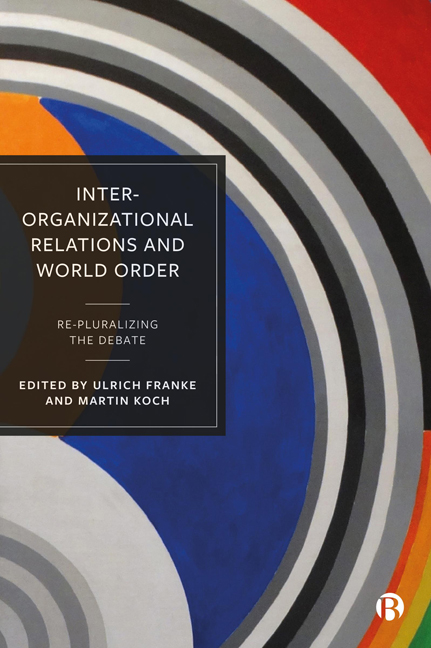Book contents
- Frontmatter
- Contents
- List of Figures and Tables
- List of Abbreviations
- Notes on Contributors
- Acknowledgements
- 1 Introduction: Examining Inter-Organizational Relations
- 2 Hybrid Anti-Impunity Commissions and the Rule of Law
- 3 Inter-Organizational Relations in Counterterrorism
- 4 Changing Models of Peacekeeping and the Downsizing of Human-Rights Norms
- 5 Political Cleavages and the Competition over Epistemic Authority
- 6 Individual Linking Pins and the Life Cycle of Inter-Organizational Cooperation
- 7 The UN Global Compact as Inter-Organizational Relations
- 8 World Sports and Russia’s War Against Ukraine
- 9 Conclusion: A Pragmatist View of Inter-Organizational Relations and World Order
- Index
7 - The UN Global Compact as Inter-Organizational Relations
Published online by Cambridge University Press: 03 April 2024
- Frontmatter
- Contents
- List of Figures and Tables
- List of Abbreviations
- Notes on Contributors
- Acknowledgements
- 1 Introduction: Examining Inter-Organizational Relations
- 2 Hybrid Anti-Impunity Commissions and the Rule of Law
- 3 Inter-Organizational Relations in Counterterrorism
- 4 Changing Models of Peacekeeping and the Downsizing of Human-Rights Norms
- 5 Political Cleavages and the Competition over Epistemic Authority
- 6 Individual Linking Pins and the Life Cycle of Inter-Organizational Cooperation
- 7 The UN Global Compact as Inter-Organizational Relations
- 8 World Sports and Russia’s War Against Ukraine
- 9 Conclusion: A Pragmatist View of Inter-Organizational Relations and World Order
- Index
Summary
Introduction
Since its creation in 1999, the UN Global Compact (UNGC) has been discussed as a prime example of global governance involving multinational enterprises (MNEs) (Rasche and Gilbert, 2012; see also Ruggie, 2001). As a multi-stakeholder initiative (MSI), the UNGC is designed to bring different entities together to discuss and improve standards for human rights, labour conditions and the environment, as well as combat corruption. Fostering corporate social responsibility (CSR), transparency and dialogue, the UNGC, at least for advocates, promotes and expands fundamental responsibilities of business in a globalized economy. Such an economy, it has been argued, is ‘ungovernable’ through states alone (Held and McGrew, 2002). With this logic, the UNGC marks an important step towards a more inclusive and effective global governance (Brown et al, 2018). Contrary to this, critics of the UNGC have emphasized that the Compact remains limited in its current form since compliance with its principles remains voluntary and the network appears too loose (Andrews, 2019). Following this account, the UNGC, at best, has no impact. At worst, it provides an opportunity for MNEs to ‘bluewash’ themselves by capitalizing on the moral authority of the UN (Berliner and Prakash, 2015).
Going into its third decade, the debate between these two sides has not been settled and the overall impact of the initiative remains more uncertain than ever (Podrecca et al, 2021). In this chapter, I want to relate to and weigh in on this debate by framing the UNGC through the lens of interorganizational relations (IOR). The rationale for this is simple: I argue that both advocates and critics rely on a similar and ultimately limited ontology of governance and the UNGC. Both assume the existence of independent global governors deliberately interacting within the Compact. The UNGC as such becomes a space to meet but otherwise does not have any transformational impact on the actors involved (Barrese et al, 2020). In other words, neither reading takes inter-organizational dynamics into consideration that potentially change how MSIs evolve over time and constitutively affect their participants. Furthermore, neither reflects how MNEs, NGOs, cities and other public-sector entities mutually recognize each other and thereby (re)produce their agency as constituents within the UNGC.
- Type
- Chapter
- Information
- Inter-Organizational Relations and World OrderRe-Pluralizing the Debate, pp. 147 - 170Publisher: Bristol University PressPrint publication year: 2023



